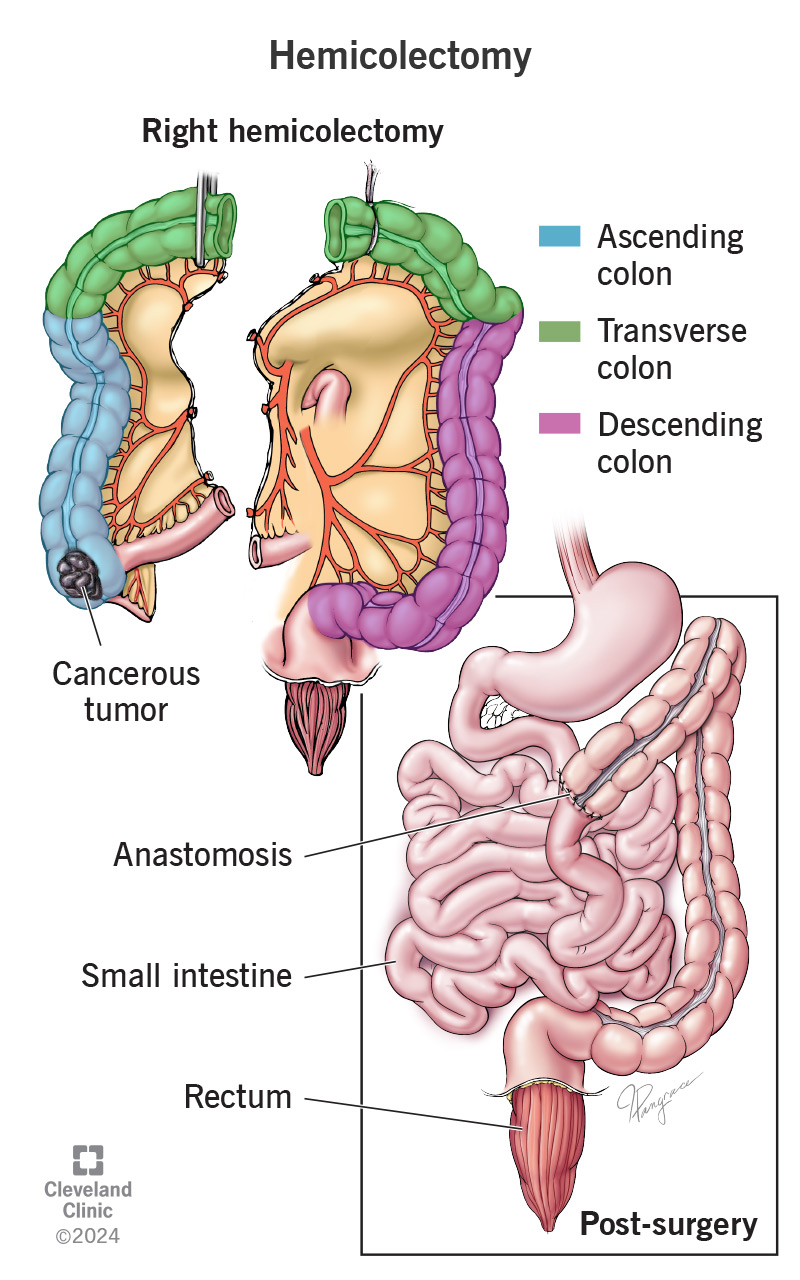A hemicolectomy is surgery to remove one side of your colon. It involves removing a section of your colon on the right side of your body (right hemicolectomy) or your left side (left hemicolectomy). You may have a hemicolectomy because you have a precancerous condition in your colon, colon cancer or a severe form of certain digestive diseases.
Advertisement
Cleveland Clinic is a non-profit academic medical center. Advertising on our site helps support our mission. We do not endorse non-Cleveland Clinic products or services. Policy

Image content: This image is available to view online.
View image online (https://my.clevelandclinic.org/-/scassets/Images/org/health/articles/hemicolectomy.jpg)
A hemicolectomy is a surgical procedure to remove a section of the right side or the left side of your colon. Your colon is the largest part of your large intestine, which is in the lower part of your abdomen (belly).
Advertisement
Cleveland Clinic is a non-profit academic medical center. Advertising on our site helps support our mission. We do not endorse non-Cleveland Clinic products or services. Policy
If you have colon cancer, a hemicolectomy may reduce the risk it will spread. If you have a severe form of digestive disease, it can ease your symptoms. But a hemicolectomy can be a life-changing event because it can affect how you poop. Your surgeon may do an ostomy. This is a new opening in your abdominal wall. Your poop goes through the hole into an ostomy bag. Whether it’s temporary or permanent, an ostomy may mean making some changes in your daily activities.
Your colorectal surgeon may recommend this surgery if:
There are two types of hemicolectomies: a right hemicolectomy and a left hemicolectomy.
Advertisement
Yes, it is. Even though most hemicolectomies are minimally invasive, they’re major surgeries because:
Your care team will explain all the steps you should take before your surgery. Here are some general suggestions:
Most hemicolectomies are minimally invasive (laparoscopic or robotic) surgeries. Here’s what typically happens during a laparoscopic hemicolectomy:
A laparoscopic hemicolectomy typically takes two to three hours to complete. Your care team will update your family and/or friends throughout your surgery.
You’ll stay in the hospital for three to four days. While you’re in the hospital, you’ll:
If you have colon cancer, a hemicolectomy may remove the cancerous tumor. Removing the tumor reduces the risk that cancer will spread and can often cure cancer alone. A hemicolectomy for conditions like irritable bowel disease can ease symptoms.
Complications after a hemicolectomy may include:
Advertisement
Everyone’s situation is a bit different. You should be able to do your normal routine within one to two weeks. You should be able to:
Contact your surgeon if you have:
In this procedure, your surgeon removes all of your colon on the right side of your body and some or all of your transverse colon. This is the section of colon that runs along the top of your abdomen. It’s often treatment for cancer in your splenic flexure. This is a tiny bend in your colon.
It may be a relief to have a hemicolectomy. If you have colon cancer, the surgery may keep it from spreading. If you’re coping with severe irritable bowel disease symptoms, a hemicolectomy may ease those symptoms. But this surgery often involves an ostomy, which may mean changing some of your daily routines.
Be sure to let your provider know if you’re worried about life after surgery. Your care team will be there to answer your questions and help you adjust.
Advertisement

Sign up for our Health Essentials emails for expert guidance on nutrition, fitness, sleep, skin care and more.
Learn more about the Health Library and our editorial process.
Cleveland Clinic’s health articles are based on evidence-backed information and review by medical professionals to ensure accuracy, reliability and up-to-date clinical standards.
Cleveland Clinic’s health articles are based on evidence-backed information and review by medical professionals to ensure accuracy, reliability and up-to-date clinical standards.
Some conditions like rectal and colon cancer, Crohn’s disease and ulcerative colitis may require colorectal surgery. Cleveland Clinic has the expert care you need.
